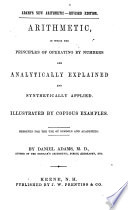 | Daniel Adams - Arithmetic - 1848 - 322 pages
...quotient. Thus, 24 -*- 2 = 12 ; 6-r-2 = 3; and 12 -f- 3 = 4, which is equal to the quotient of 24 -~- 6, the same as before. Hence, PRINCIPLE III. Multiplying...by the same number does not alter the quotient. IT j>0. EXAMPLE. It is required to multiply 24 by 6, and •divide the product by 6. 24x6 = 144, and the... | |
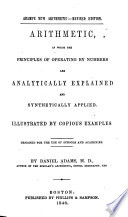 | Daniel Adams - Arithmetic - 1848 - 330 pages
...quotient. Thus, 24 -=- 2 = 12 ; 6 -j- 2 == 3 ; and 12 -=-3= 4, which is equal to the quotient of 24-j-6, the same as before. Hence, PRINCIPLE III. Multiplying...by the same number does not alter the quotient. IT 50. EXAMPLE. It is required to multiply 24 by 6, and divide the product by 6. 24 X 6 = 144, and the... | |
 | Daniel Adams - Arithmetic - 1848 - 320 pages
...the quotient of 24 -•- 6, tho same as before. Hence, PRINCIPLE III. Multiplying or dividing botli dividend and divisor by the same number does not alter the quotient. EXAMPLE. It is required to multiply 24 by 6, and divide the product by 6. 24 X 6 = 144, and the produci... | |
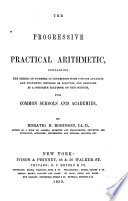 | Horatio Nelson Robinson - Arithmetic - 1859 - 348 pages
...divisor divides the quotient ; and dividing the divisor multiplies the quotient. (86. Ill and IV.) PRIN. III. Multiplying or dividing both dividend and divisor by the same number, does not alter the quotient. (86 . V and VI.) 88. These three principles may be embraced in one GENERAL LAW. A change in the dividend... | |
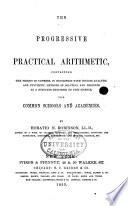 | Horatio Nelson Robinson - Arithmetic - 1859 - 362 pages
...value of the quotient. VI. If we divide both dividend and divisor by 3, we have ^--:-§=18-^3=6. Hence, Dividing both dividend and divisor by the same number, does not alter the value of the quotient. 87. These six examples illustrate all the different changes we ever have occasion... | |
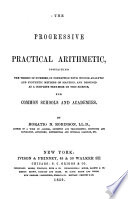 | Horatio Nelson Robinson - Arithmetic - 1859 - 352 pages
...multiply both dividend and divisor by 3,.we have 54 X 3 -f- 9 X 3 = 162 -:- 27 = 6. Hence, Multiplying both dividend and divisor by the same number, does not alter the value of the quotient. VT. If we divide both dividend and divisor by 3, we have *£-±%=18-L.3=6. Hence,... | |
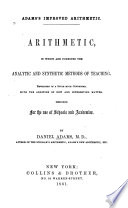 | Daniel Adams - Arithmetic - 1861 - 452 pages
...6x2 = 12, and 24 -f- 1 2 = 2, which is equal to 1 half of the quotient of 24-f-6, the same as before. PRINCIPLE III. — Multiplying or dividing both dividend...divisor by the same number does not alter the quotient. Illustration. — Example, the same as before. Multiplying both dividend and divisor by 2 does not... | |
 | John Groesbeck - Arithmetic - 1867 - 226 pages
...the square of the same number of 9s. CONTRACTIONS IN DIVISION. 38. Multiplying or dividing both the dividend and divisor by the same number does not alter the quotient. 39. To divide by any number ending in 5, or an aliquot part of 10, or any number of tens. RULE. —... | |
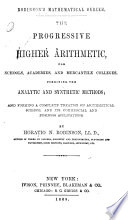 | Horatio Nelson Robinson - Arithmetic - 1868 - 468 pages
...be contained the same number of times in three times the dividend ; and so on. Hence, 5* Multiplying both dividend and divisor by the same number does not alter the quotient. 6th. If a given divisor is contained in a given dividend a certain number of times, one half the divisor... | |
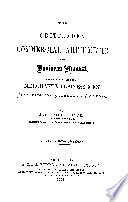 | John Groesbeck - Arithmetic - 1868 - 350 pages
...the square of the same number of 9's. CONTRACTIONS IN DIVISION. 66, Multiplying or dividing both the dividend and divisor by the same number does not alter the quotient. 67. To divide by any number ending in 5, or an aliquot part of 10, or any number of tens. RULE.—Multiply... | |
| |